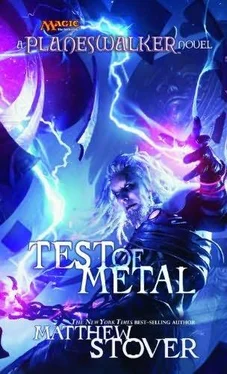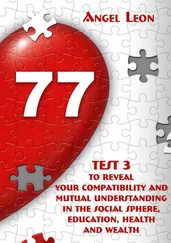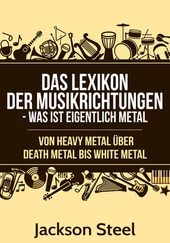Mathew Stover - Test of Metal
Здесь есть возможность читать онлайн «Mathew Stover - Test of Metal» весь текст электронной книги совершенно бесплатно (целиком полную версию без сокращений). В некоторых случаях можно слушать аудио, скачать через торрент в формате fb2 и присутствует краткое содержание. Жанр: Фэнтези, на английском языке. Описание произведения, (предисловие) а так же отзывы посетителей доступны на портале библиотеки ЛибКат.
- Название:Test of Metal
- Автор:
- Жанр:
- Год:неизвестен
- ISBN:нет данных
- Рейтинг книги:5 / 5. Голосов: 1
-
Избранное:Добавить в избранное
- Отзывы:
-
Ваша оценка:
- 100
- 1
- 2
- 3
- 4
- 5
Test of Metal: краткое содержание, описание и аннотация
Предлагаем к чтению аннотацию, описание, краткое содержание или предисловие (зависит от того, что написал сам автор книги «Test of Metal»). Если вы не нашли необходимую информацию о книге — напишите в комментариях, мы постараемся отыскать её.
Test of Metal — читать онлайн бесплатно полную книгу (весь текст) целиком
Ниже представлен текст книги, разбитый по страницам. Система сохранения места последней прочитанной страницы, позволяет с удобством читать онлайн бесплатно книгу «Test of Metal», без необходимости каждый раз заново искать на чём Вы остановились. Поставьте закладку, и сможете в любой момент перейти на страницу, на которой закончили чтение.
Интервал:
Закладка:
Mana is, functionally, only power. That is, energy-the capacity to accomplish work. A device of etherium does not require mana to operate; etherium is, itself, a source of mana-and, as I learned in my tenure at the Guild, it is a conduit that channels power from outside the universe.
In the service of the artificer, I had been taught that energy and matter are fundamentally one and the same, regardless of the form of either, and that energy can be neither created nor destroyed. The only change we can force is to alter its form. Even mana is a finite resource. Etherium, on the other hand…
Well, etherium itself is a finite resource-but the power it channels is not.
The Mechanists’ Guild teaches that etherium is the stuff of reality itself, and that by working etherium, one can touch directly the mind of god. It is, however, exceedingly bad manners to inquire “Which god?” They prefer to keep the nature of their purported deity carefully abstract. He sometimes is said to reside in etherium, sometimes in ourselves; sometimes he is said to actually be etherium itself… and sometimes etherium is said to be a channel for his grace.
The being who supposedly introduced etherium to Esper-who was reputed to have personally created, in fact, all the etherium that exists-is known there as Crucius the Mad Sphinx. Crucius is a figure of some renown and of considerable dispute. He is considered by the Mechanists to be not a sphinx at all, for example, but rather an incarnation of the will of their abstract god. This peculiar conviction was certainly sparked by the vast list of the Mad Sphinx’s gnomic utterances about “atonement with the?ther,” and by his dramatic disappearance some decades past.
Matters certainly aren’t helped by the fact that no one actually saw Crucius, with the possible exception of the Hegemon of Esper; he’s a figure one learns of only by repute, and tales grow in the telling. This bizarre cult of the Vanished Mad Sphinx is maintained and evangelized to this day by a vast and increasingly influential rabble of insufferable fanatics who name themselves the Ethersworn.
These demented pebbleheads decided-based on no actual evidence whatsoever-that the key to the “redemption” of the entire plane of Esper is to infuse every living creature with etherium. They have never been able to explicitly define what it is Esper needs to be redeemed from; again, pointing this out to them is excruciatingly bad manners. Given that the supply of etherium is finite and already fully exploited-its supposed creator may have been mad, but it seemed he was not mad enough to scatter deposits of etherium underground or at the bottom of the Sea of Unknowing-the activities of these simpletons have actually accomplished nothing other than driving the price of etherium to preposterous heights.
The normal progress through the Mechanists’ Guild from student to master is seventeen years; seven years as a student-essentially an apprentice, save that one must pay for the privilege-and ten years as a journeyman.
I was a master in five.
My rapid ascension was due, in part, to the same obsessive diligence that enabled me to escape my father and the slums of my birth, but it was also due to my experience as both scrapper and artificer. Sons and daughters of the rich cannot comprehend the actual value of an object. Nothing real is useless to a scrapper, and the limits of available finance and material are, to an artificer, absolute. If you can’t afford steel gears, you make your own, of whatever happens to be available in your shop-or if you are possessed of a mind like mine, you design your device to work without gears at all.
The pampered children of privilege who were my schoolmates had no concept of the tension between waste and elegance. Assigned to design and build a particular style of chronometer, for example, my supposed peers amassed truly baffling arrays of springs and chains, wires, gears, pendulums, ratchets, precious woods, and baroquely filigreed decorative elements. Many of their designs encompassed several hundred parts; the most efficiently elegant of their designs had no less than seventy-three.
Mine had nine.
On nearly every assignment, I completed my work far ahead of my fellows. To amuse myself while waiting for them to finish, I would gather their debris and cast-off materials from the shop’s dustbin and use them to create oddments-children’s toys, tiny automata, the sorts of fanciful devices that have no actual purpose other than to delight by their design and action-which I then sold in the Lower Vectis Grand Bazaar, for what eventually became a tidy sum, to help finance my education.
It was not long until my schoolmates lost the habit of throwing away anything at all; they would, however, sell their leftover materials and discarded parts to me for pocket change, and so for a time I ran a thriving little trade. This lasted until our supervising master noted that every dustbin was as clean after our shop hours as it had been before them. The explanation-that they were selling their scraps to me, and I was peddling devices I made from them-earned me a visit from the three Governing Masters.
The masters looked over my impeccably organized work space-I had built a variety of storage devices to keep my materials clean, separate, and easy to locate at need-and one of them asked me why my bench was stuffed with trash.
“What trash?” said I. He indicated my multitudinous cabinets and arrays of drawers, which were stocked with everything from crumpled scraps of gold foil to tailings of badly tanned sluice serpent hide.
“With apologies for daring to disagree with my betters, Masters,” I said, “none of these contain trash; their contents are simply materials I have not yet found a use for.”
They elevated me to journeyman on the spot.
The position of journeyman was the only reason I’d come to the Guild in the first place. I did not plan to spend my life flattering the vanity of the wealthy and powerful by providing them with self-powered trinkets and enhanced body parts. I was there to learn to work etherium, and nothing else.
I was ready to build my right arm.
I had known what I was to build-I had dreamed it a decade before, and spent every intervening day of my life refining its design until I knew it would make of me the man I had decided to be. My right arm was why I taught myself the art of scrapping for etherium, why I had trained myself to steal from my father, why I’d apprenticed as an artificer, and why I had become a sneak thief and a killer of bandits and rippers. My right arm was the reason I had devoted my life to the study of all conceivable elements of design and construction.
When my father had been in one of his occasional expansive moods-merely intoxicated by the drugs he craved, rather than unconscious and prostrate-he liked to say that there were only two things in all creation he knew would never fail him: death and his right arm. Fool that he was.
His right arm was nothing. Flesh and bone. As corrupt and rotten as his filthy heart.
My right arm is none of these things.
There are some who have spoken of my arm, and claimed it to be psychological compensation for my lowly birth. Others have called it the badge of my self-creation. Still others have named it a symbol of power, a fetish, a talisman against self-doubt. All these people have one defining trait in common.
They’re idiots.
The circumstances of my birth are irrelevant. I have no need for a “badge” of any kind; I am the proof of my self-creation. And my arm is not, nor has it ever been, a symbol of power, nor of anything else. It’s not a symbol.
It is power.
Most “etherium enhancements” barely warrant the name. Etherium in its unworked state is a soft metal and almost infinitely ductile. Even the richest mages use baser metals that are stronger, and a great deal easier to come by, such as titanium or cobalt. They build their enhancements of these, merely threading the structure through with infinitesimal strands of etherium-only enough to power the enchantments that enable the prosthesis to mimic the function of the part it replaces.
Читать дальшеИнтервал:
Закладка:
Похожие книги на «Test of Metal»
Представляем Вашему вниманию похожие книги на «Test of Metal» списком для выбора. Мы отобрали схожую по названию и смыслу литературу в надежде предоставить читателям больше вариантов отыскать новые, интересные, ещё непрочитанные произведения.
Обсуждение, отзывы о книге «Test of Metal» и просто собственные мнения читателей. Оставьте ваши комментарии, напишите, что Вы думаете о произведении, его смысле или главных героях. Укажите что конкретно понравилось, а что нет, и почему Вы так считаете.












